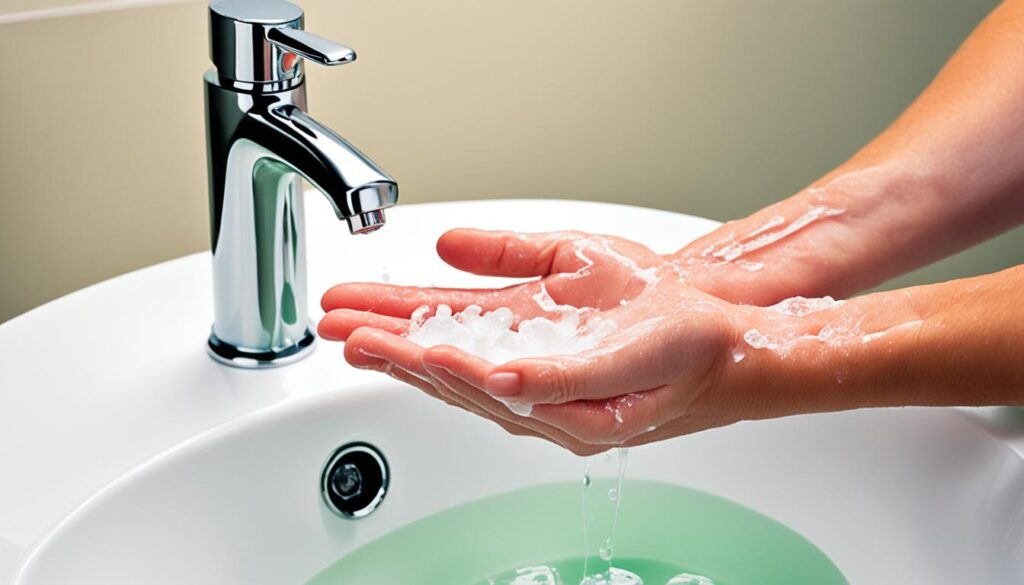Preventing common colds is key. Use strategies that lower your chances of getting sick. These include getting a flu shot and keeping your hands clean. Doing these things helps make your body stronger so it can fight off cold viruses.
Key Takeaways:
- Getting a flu vaccination is essential for preventing common colds.
- Washing your hands frequently helps prevent the spread of cold and flu viruses.
- Avoid touching your face, as it can lead to the entry of germs into your body.
- Getting enough sleep strengthens your immune system and lowers the risk of illness.
- Regular exercise not only benefits your overall health but also boosts your immune system.
Get a Flu Vaccination
Getting a flu shot is key to avoiding common colds. The flu is very contagious and can make people really sick. A vaccination helps shield you from it, lessening the chance of catching a cold.
Talk to your doctor about the flu shot, especially early in the season. Flu shots aim to protect you from the current strains of the virus. It’s wise to get a dose each year since the flu changes and new strains appear.
For some, like kids, older folks, pregnant women, and those with certain health issues, the flu can be very dangerous. By being vaccinated, you help keep everyone safer from the flu.
A flu shot is a safe and powerful way to fight the flu and stop it from spreading. Don’t wait for the flu to arrive. Be proactive and get your shot early to stay healthy.
Getting a flu shot helps protect both you and those around you. Make sure to get vaccinated against the flu.
Wash Your Hands Frequently
Keeping your hands clean is key in stopping cold and flu. The best way to kick out germs is hand washing. You need to wash your hands with soap and warm water after being in contact with others, before meals, and before you touch your face.

Preventing germ spread is a big deal. Washing your hands can get rid of tiny bugs that make us sick. Remember to:
- Wet your hands with clean, running water.
- Apply soap and lather thoroughly, covering all surfaces.
- Scrub your hands for at least 20 seconds, including between your fingers and under your nails.
- Rinse your hands well under running water.
- Dry your hands using a clean towel or air-dry them.
Using the right hand washing steps helps you beat bacteria and viruses. This keeps sickness away. Regular hand washing is the best way to stop germs from spreading and stay healthy.
Handwashing Tips:
“Always wash your hands really well, particularly in the winter. It’s a smart way to avoid getting sick.” – Dr. Emily Johnson, Infectious Disease Specialist
| Benefits of Hand Washing | Steps for Effective Hand Washing |
|---|---|
| Reduces the risk of cold and flu | Wet hands with clean water |
| Prevents the spread of germs | Apply soap and lather thoroughly |
| Protects against other infectious diseases | Scrub hands for at least 20 seconds |
| Keeps hands clean and fresh | Rinse hands well under running water |
Avoid Touching Your Eyes and Mouth
Cold and flu germs can get into your body through your eyes and mouth. It’s key to not touch your face. This stops the spread of viruses and lowers the chance of getting sick.
Breaking the face-touching habit is hard but it’s necessary. You should start by noticing how much you touch your face. When you realize it, think about the risks. try hard not to touch your face.
And, keep your hands clean by washing them a lot. This cuts down on the germs that could get on your face.
Start with avoiding touching your face to stop viruses. This simple action is strong in keeping you healthy.
| Ways to Avoid Face Touching | Benefits |
|---|---|
| Keep your hands busy with a stress ball or fidget toy | Creates a distraction from the impulse to touch your face |
| Wear glasses or sunglasses to create a physical barrier | Provides a reminder and obstruction for your hand reaching your eyes |
| Maintain a clean workspace and frequently disinfect high-touch surfaces | Reduces the presence of germs in your environment |
| Avoid unnecessary face contact, such as leaning on your hand or resting your chin on your palm | Minimizes the opportunity for germ transmission |
Using these strategies to avoid touching your face works. Encourage others to do the same. This way, we help prevent the spread of viruses.
Get Adequate Sleep
Getting enough sleep is key to keeping your immune system strong. Sleep helps your body fight off sickness. Without enough rest, your immune system weakens, making you more likely to get sick.

Aim for 7 to 9 hours of quality sleep every night. This will help your body fight against illnesses. While you sleep, your body makes cytokines. These are proteins that help fight infections. If you don’t get enough sleep, your body makes fewer of these proteins. This makes you more likely to get sick.
Sleep does more than just help your immune system. It also makes you feel better overall and think more clearly. It helps your brain focus, improves your mood, and helps you remember things. Sleep is vital for keeping stress levels low, which can harm your immune system.
“Sleep is the golden chain that ties health and our bodies together.” – Thomas Dekker
To get better sleep, set a regular sleep schedule. Have a calming bedtime routine. And make sure your sleep area is comfy and quiet. Avoid using screens, drinking caffeine, or doing exciting things before bed. A good mattress and pillows can make a big difference, too.
By making sleep a priority, you can enjoy better health. You’ll have a stronger immune system and feel more well rested.
Exercise Regularly
Adding physical activity to your daily life offers more than a healthy heart and weight. It can boost your immune system, helping you fight off colds and illnesses better.
When you exercise, your body makes more antibodies and white blood cells. These guys protect you from harmful germs, keeping you healthier.
Also, working out helps lower stress. Your body releases endorphins, which make you feel good. This reduces stress and makes you happier.
“Regular exercise not only benefits your physical health but also has a positive impact on mental and emotional well-being.”
So, make exercise part of your routine to improve your immune system and reduce stress, making you less likely to get ill. It’s great for overall health.
Enjoy activities like jogging, yoga, swimming, or sports. Try to do 150 minutes of moderate exercise a week with strength training twice. This will keep your immune system strong and you feeling great.
“Take the time to exercise regularly and reap the immune-boosting and stress-reducing benefits it provides.”
Benefits of Regular Exercise:
| Physical Benefits | Psychological Benefits |
|---|---|
| Strengthens the immune system | Reduces stress and anxiety |
| Improves cardiovascular health | Enhances mood and general well-being |
| Aids in weight management | Promotes better sleep |
| Reduces the risk of chronic diseases | Boosts self-confidence |
Regular exercise helps both physically and mentally, not just by strengthening your immune system. It improves health and stress management.
Use Hand Sanitizer
Hand sanitizer is a must-have for fighting germs when you’re out. It’s easy to carry and perfect when you can’t wash your hands. Using it keeps you safe from germs while you’re on the move.
Pick a sanitizer with at least 60% alcohol for the best results. These kinds can kill various germs, like the cold virus. This makes them very effective at keeping you healthy.
Hand sanitizer is fast and works well to stop the spread of germs. If you use it right, it will kill the germs on your hands. This helps keep others safe too. Here’s how to use it:
- Put enough sanitizer on one hand to cover it.
- Then, rub it all over your hands, including between your fingers.
- Please keep rubbing until your hands are dry.
Always use hand sanitizer after touching things many people touch. This includes doorknobs and shopping carts. It’s also great for travel or when you’re in public and can’t find a sink.
Benefits of Hand Sanitizer:
“Hand sanitizer is a great way to stay germ-free when you can’t wash your hands. It’s effective and easy to use, which is important in stopping germ spread.”
Using hand sanitizer daily makes you and those around you safer. Just remember, it’s not a substitute for washing your hands with soap for at least 20 seconds. But, when that’s not possible, hand sanitizer offers key protection against harmful germs.

| Hand Sanitizer Comparisons | Alcohol-Based Sanitizer | Non-Alcohol-Based Sanitizer |
|---|---|---|
| Effectiveness against common cold viruses | High | Low |
| Convenience for on-the-go use | High | High |
| Quick-drying formula | Yes | No |
| Pleasant Fragrance | Yes | Yes |
Avoid Biting Your Nails
Biting your nails might seem innocent, but it’s not. It can spread germs and lower hand cleanliness. Germs hide under nails, helping bacteria and viruses that cause sicknesses like colds and flu to thrive.
When you bite your nails, you bring these germs into your mouth. This can lead to you getting sick, especially when cold and flu are going around more.
It’s crucial to stop nail biting for good hand hygiene. Instead, try to find other ways to deal with stress. Using a stress ball or fidget toy can help keep your hands busy.
Keep your nails clean and short to lower the chance of germ buildup. Also, always wash your hands with soap and water, especially before and after touching things that might have germs.
By not biting your nails, you help keep your hands clean. This reduces the risk of getting sick during cold and flu season.
| Why you should avoid nail biting | Benefits of breaking the habit |
|---|---|
| 1. Germs can hide underneath your nails. | 1. Improved hand hygiene. |
| 2. Increases the risk of germ transmission. | 2. Reduced risk of infection. |
| 3. Compromises hand hygiene practices. | 3. Protection during cold and flu season. |
Avoid Close Contact with Ill Individuals
Preventing the cold and flu starts with keeping away from those already sick. This is key during peak flu season. Also, be cautious if you see someone sneezing or coughing near you.
Keep your distance from coughing or sneezing people. This helps you not breathe in their droplets.
When sick people cough or sneeze, tiny droplets can fill the air. They can get into your body when you breathe or touch your face. Keeping your distance from sick people lowers this risk.
If you’re feeling unwell, the best choice is to stay home. It helps your body heal and keeps you from passing germs to others.
When sick, it’s best to stay home. This way, you stop spreading germs.
When coughing or sneezing, cover your nose and mouth with a tissue or your elbow. This simple act can stop the virus from spreading to others. By doing so, you protect yourself and those around you from illness.
Remember:
- Avoid close contact with sick individuals, especially during the flu season.
- Stay at home if you are feeling unwell to prevent spreading germs to others.
- Practice respiratory etiquette by covering your mouth and nose when coughing or sneezing.
Just by following these easy steps, you can do a lot to stop the cold and flu from spreading. This way, you take charge of your health.
Comparison of Preventive Measures
| Preventive Measure | Description | Effectiveness |
|---|---|---|
| Getting a flu vaccination | Consult with your physician about getting a flu shot to protect yourself from the flu virus. | High |
| Washing your hands frequently | Practice good hand hygiene by washing hands with soap and water to prevent the spread of germs. | High |
| Avoiding touching your eyes and mouth | Avoiding contact with your eyes and mouth helps prevent the transmission of cold and flu viruses. | Moderate |
| Getting adequate sleep | Getting enough sleep helps boost your immune system and prevents illness. | Moderate |
| Exercising regularly | Regular exercise strengthens your immune system and helps manage stress. | Moderate |
| Using hand sanitizer | Carry alcohol-based hand sanitizer for on-the-go germ protection. | Moderate |
| Avoiding nail biting | Prevent the transmission of germs by refraining from biting your nails. | Low |
| Avoiding close contact with ill individuals | Maintain a distance from sick people to prevent the inhalation of respiratory droplets. | High |
| Eating a healthy diet | A well-balanced diet supports your immune system and reduces the risk of common colds. | Moderate |
| Staying hydrated | Proper hydration flushes toxins from your system and promotes overall health. | Moderate |
These actions, when combined, lower your chance of catching a cold. They also help you stay healthy.

Eat a Healthy Diet
A good diet is key to a strong immune system and fighting off colds. It’s vital to eat immune-boosting foods for good nutrition for immunity. Including plenty of fruits and vegetables in your meals helps greatly.
Fruits and veggies are full of vitamins, minerals, and fiber. They keep our immune system strong. Eating a variety every day ensures you get all the good stuff for your health.
Some great immune-boosting foods to eat are:
- Oranges: They have lots of vitamin C, which helps your body make white blood cells to fight sickness.
- Broccoli: With A, C, and E vitamins plus fiber and antioxidants, it’s amazing for your immunity.
- Spinach: It’s full of vitamin C, antioxidants, and beta carotene, all boosting your immune system.
- Blueberries: These small fruits pack a big punch with antioxidants that support a healthy immune system.
- Garlic: It fights off colds and flu because of its antimicrobial and antiviral properties.
Adding these foods to your meals each day is smart. It keeps your immune system strong, aids in maintaining a good weight, and supports overall health. Don’t forget to eat a wide variety of fruits and vegetables to get all their benefits.
| Immune-Boosting Foods | Nutrition |
|---|---|
| Oranges | High in vitamin C and antioxidants. Boosts white blood cell production. |
| Broccoli | Rich in vitamins A, C, and E, fiber, and antioxidants. Enhances immune function. |
| Spinach | A great source of vitamin C, antioxidants, and beta carotene. Supports a healthy immune system. |
| Blueberries | Packed with antioxidants that combat free radicals and contribute to immune health. |
| Garlic | Known for its antimicrobial and antiviral properties. Helps prevent colds and flu. |
Stay Hydrated
Drinking enough water keeps us healthy and fights off the common cold. Fluids help our bodies get rid of harmful substances. They also boost our immune system.
Keeping hydrated makes our bodies work better. Nutrients and oxygen move to our cells faster. This includes the cells that fight off sickness.
Fluid Intake Recommendations
The right amount of water depends on many things like age, how active we are, and where we live.
- Most adults need at least 8 glasses or 64 ounces of water daily.
- People who exercise a lot or live in warm places should drink more water. They need to make up for what they lose through sweat.
It’s key to drink when you feel thirsty. And in cold and flu seasons, staying hydrated is extra important. This helps our bodies protect us naturally.
Tips for Maintaining Hydration
- Always have a water bottle with you to make drinking water easy.
- Use reminders or a schedule to drink water regularly.
- Eat plenty of fruits and veggies. They have lots of water, helping you stay hydrated.
By drinking enough water, you support your immune system and lessen cold risks. So, remember to sip on water every day. It’s a simple way to stay healthy!
Conclusion
By following these steps, you can cut your risk of getting a cold. It helps keep your immune system strong. Start with getting the flu shot and keeping your hands clean. Avoid face touching, sleep enough, and exercise to boost your immunity.
Hand sanitizer, not biting your nails, and staying away from sick people are key. Eat well and drink plenty of water. This keeps your immune system healthy and lowers cold risks.
So, use these tips to live healthier and avoid getting sick. Make them part of your daily life. This way, you can stay well all year long.
FAQ
How can I prevent common colds?
There are many ways to avoid catching a cold. First, consider getting a flu shot. Next, wash your hands a lot and try not to touch your face. It’s also wise to sleep well, work out, and use soap or hand sanitizer. Always eat healthy and drink enough water. Lastly, stay away from people who are sick.
Why is getting a flu vaccination important in preventing common colds?
A flu shot helps stop common colds before they start. Talk to your doctor about when to get it. It’s usually best to get vaccinated before flu season kicks off.
How does practicing good hand hygiene help prevent common colds?
Keeping your hands clean is key in stopping viral illnesses. After greeting someone, before meals, and anytime you’ll touch your face, wash well. Doing this cuts down on spreading cold and flu bugs.
Why should I avoid touching my face to prevent common colds?
Your eyes, nose, and mouth are the main doors for bugs to get in your body. To keep illness away, don’t touch your face. If you must, make sure your hands are clean first.
How does getting enough sleep help prevent common colds?
Sleep strengthens your body’s defense. Aim for 7 to 9 hours nightly to keep illnesses at bay.
How does regular exercise prevent common colds?
Exercise isn’t just good for your heart and body weight. It also boosts your immune system. Plus, it helps you handle stress better, which is key during cold and flu season.
How can hand sanitizer help prevent common colds?
When you can’t wash, use hand sanitizer. Pick one that’s alcohol-based. It’s a quick and easy way to kill germs.
Why should I avoid biting my nails to prevent common colds?
Germs like to hide under your nails. Biting adds to the risk of getting sick. So, stop nail biting to keep germs away.
How does avoiding close contact with ill individuals prevent common colds?
Keep your distance from coughing or sneezing people to avoid their germs. Also, if you feel ill, stay home to prevent giving it to others.
How does eating a healthy diet prevent common colds?
Eating well can do wonders for your immune system. Add lots of fruits and veggies to your diet. This will help you steer clear of colds.
Why is staying hydrated important in preventing common colds?
Drinking enough water detoxifies and keeps you healthy. Good hydration is essential to avoid getting sick.
What are some strategies to prevent common colds?
There are several ways to lower your risk of colds. Start with a flu shot. Keep your hands clean and don’t touch your face. Sleep enough, exercise, and use hand sanitizer. Also, don’t bite your nails. Stay away from sick people, eat well, and drink plenty of water. These steps are your all-season guide to staying well.




















